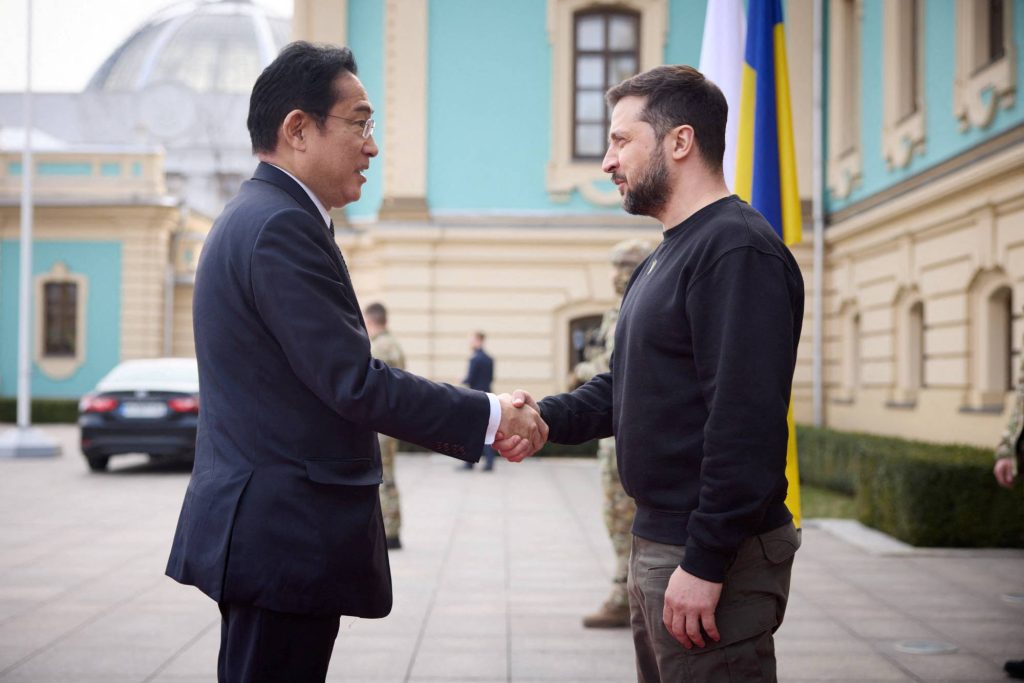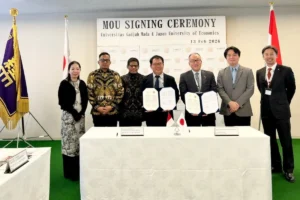Kishida meets Zelenskyy for talks in surprise visit to Ukraine

Kyiv, The Gulf Observer: Prime Minister Fumio Kishida met Ukrainian President Volodymyr Zelenskyy on Tuesday in Kyiv, in a rare and unannounced visit that highlighted Japan’s support for the war-torn country in the face of Russia’s ongoing invasion.
The Japanese leader arrived in the Ukrainian capital on Tuesday afternoon local time by rail from neighboring Poland, becoming the final Group of Seven leader to visit the country since Russia’s Feb. 24, 2022, invasion.
Zelenskyy posted footage to social media of the two leaders’ meeting in central Kyiv, with the Ukrainian leader calling him “a truly powerful defender of the international order and a longtime friend” of the country.
Speaking at a joint news conference after their talks, the Ukrainian leader, who has only left his country since the start of the war a handful of time, said he would attend May’s G7 summit in Hiroshima via video link after being invited by Kishida. Japan is this year’s G7 chair.
Kishida said that $30 million would be provided via a NATO fund to assist Ukraine with nonlethal military gear. Japan, which has strict guidelines in place that effectively ban arms exports, has provided Ukraine with aid in the form of surveillance drones, bulletproof vests, helmets, tents and medical supplies.
Ahead of the meeting, Kishida visited a mass grave site in Bucha, a city outside Kyiv where Russian troops are accused of massacring civilians, laying a wreath outside a church near the site before observing a moment of silence.
“The world was astonished to see innocent civilians in Bucha killed one year ago. I really feel great anger at the atrocity upon visiting that very place here,” Kishida said.
“I would like to give condolence to the all victims and the wounded on behalf of the Japanese nationals. Japan will keep aiding Ukraine with the greatest effort to regain peace,” he added.
Earlier Tuesday, Japan’s Foreign Ministry said Kishida would convey the “solidarity and unwavering support for Ukraine” of Japan and other G7 nations during the meeting while “firmly rejecting Russia’s aggression and unilateral attempts to change of the status quo by force.”
Kishida, who had been visiting India and was expected to return to Tokyo, entered Poland from India using a secretly chartered plane instead of the standard government aircraft, NHK reported.
The chartered plane left Tokyo’s Haneda Airport at around 8 p.m. on Sunday, about three hours before a government plane carrying Kishida departed for India. After wrapping up his scheduled events in India, the prime minister secretly boarded the waiting plane in the early morning hours of Tuesday, Japan time.
NHK said the plane, which seats about 10 people, was the same model as the one used by Japanese baseball star Shohei Ohtani when he returned to Japan from the United States earlier this month.
Kishida was due to return to Poland on Wednesday after the talks with Zelenskyy, where he would meet officials from the front-line country to “strengthen bilateral and behind-the-scenes international cooperation,” the Japanese Foreign Ministry said.
The previously unannounced visit comes more than a year after Russia invaded neighboring Ukraine, triggering a bloody war that has seen the West and Japan present a united front in the face of Moscow’s aggression. Kishida’s visit also comes nearly a month after U.S. President Joe Biden made a secret visit to Kyiv — his first since the war erupted — where he met with Zelenskyy.
Kishida, whose administration has strongly backed Kyiv while joining efforts to sanction Russia and aid Ukraine, had repeatedly shown an eagerness to meet with Zelenskyy in person before the Hiroshima G7 summit.
“The situation in Ukraine and support for the country will be a major theme at the G7 Hiroshima summit,” NHK quoted LDP Secretary-General Toshimitsu Motegi as saying ahead of Kishida’s arrival in Kyiv on Tuesday, saying it was “of great significance” that the prime minister “sees the situation on the ground firsthand.”
After a Jan. 6 telephone call with Zelenskyy, Kishida said he had been invited to visit Ukraine and that he had been seriously considering the invitation. But a number of challenges, most notably concerns over the difficulty in keeping the trip schedule and route a secret, had been seen as obstacles to an earlier visit.
“The main thing about the trip is that it has finally happened,” said James D.J. Brown, a political science professor at Temple University Japan. “That is no small achievement, since it required overcoming the restrictive customs of the Japanese parliament and the suffocating conservatism of the country’s bureaucracy. Kishida deserves credit for insisting on going.”


